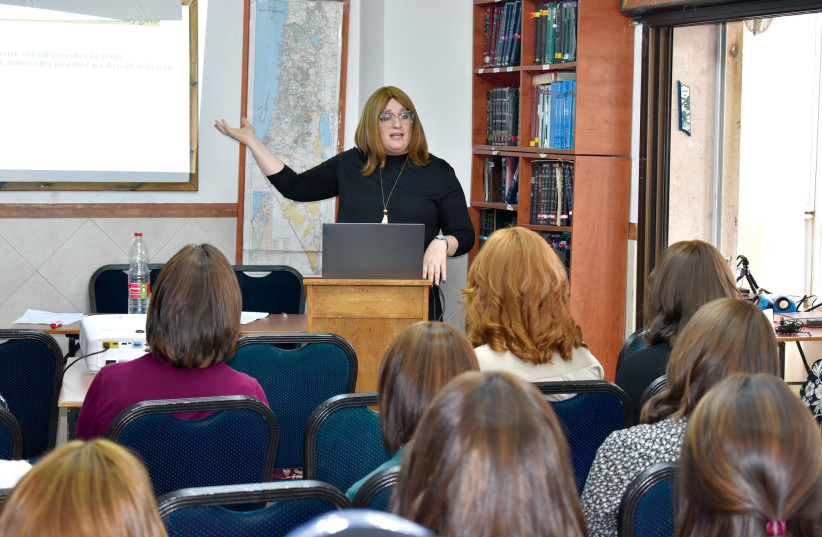It has been almost five years since Amudim Israel first opened its doors, offering comprehensive crisis management services to American students studying abroad. The need for services in Israel had become painfully clear, with Amudim’s New York office responding to more than 200 cases involving gap-year American students in its first two years of operations, as young adults who were thousands of miles away from their abusers finally reached out for much-needed help.
Amudim Israel has opened more than 1,700 cases since it first began operations in late 2017, with the anticipated calls for help coming in exactly as predicted.
“We get calls from gap-year students specifically because now that they are away from home, it’s the first time they are in a safer and freer place, and can feel comfortable facing their trauma history,” Amudim Israel director Yosi Golberstein told The Jerusalem Report.
“We get calls from gap-year students specifically because now that they are away from home, it’s the first time they are in a safer and freer place, and can feel comfortable facing their trauma history.”
Yosi Golberstein
Israel: The first time gap-year students feel safe to face their trauma
The stories are largely the same, noted Golberstein. Poised as they are at a pivotal period of personal growth and introspection, students muster up the courage to face their past head-on, some making the decision because of an inability to function, while others understand intuitively the need to chart a healthy course for the future. Amudim Israel’s staff of eight case managers is ready to provide gap-year students with support, help them understand their trauma, identify a path to healing and arrange appropriate treatment resources.

While every case and every individual are unique, the stories that flood Amudim Israel’s phone lines are largely the same. One relatively recent case involved a yeshiva student named Mordechai*, who had fallen into a pattern of substance abuse as a method of coping with the pain of having been repeatedly sexually abused by an uncle.
Mordechai was barely functional by the time he called Amudim Israel, and a case manager was able to coordinate therapy, which also included finding outside assistance to cover the cost, part of which was subsidized by Amudim Israel. The case manager also stayed in touch with Mordechai, his therapist and the yeshiva to monitor his progress, making sure that he was being adequately supported. Mordechai’s road was a rocky one, and there were times during his treatment that he relapsed and even contemplated suicide, but his case manager’s support helped him continue with his therapy as he navigated the road to wellness.
In another instance, Miriam, a seminary student, reached out for help after arriving in Israel, saying that she had been abused for years by a close family friend. Amudim Israel helped Miriam identify a proper treatment regimen and worked with her to find funding to pay her significant therapy costs. Over time, Miriam realized that she wanted to press charges against her attacker, an effort that was coordinated by her case manager but ultimately had her family cutting her completely out of their lives.
Amudim Israel was there for Miriam yet again, providing for her emotional and material needs during her stay in Israel as she successfully underwent two years of intense therapy. Amudim’s New York office helped Miriam get back on her feet when she returned to Maryland, and today she has a master’s degree, is happily married, and is leading a healthy and productive life.
The challenges of dealing with gap-year students
Dealing with gap-year students presents several unique challenges. Being far from home and living in close quarters with other students is a major life adjustment, one that can create tremendous pressure, especially for those who are image-conscious. With students having very little privacy, simply going out for therapy each week often raises eyebrows, especially when sessions take place during shiurim (classes).
The financial aspect is also significant, with typical student or travelers’ insurance policies having minimal mental health care coverage, if any, leaving yeshivah and seminary students shouldering the considerable out of pocket cost of their treatment.
Amudim Israel is addressing that particular issue by launching a clinic in partnership with the Wurzweiler School of Social Work within the next few weeks. While not exclusive, the clinic’s initial target population will be gap-year students, who are ineligible for the overwhelming majority of mental health service provided by the government because they aren’t Israeli citizens.
“We look forward to being able to provide gap-year students with affordable treatment while maintaining a high clinical and professional standard when the clinic opens,” said Golberstein.
The demand for Amudim Israel’s services continues to rise, and the 620 new cases opened in the 2021-2022 academic year was an increase of 95% over the previous year.
Amudim CEO Rabbi Zvi Gluck noted that corona had a major mental health impact, with an unprecedented number of people reaching out for assistance, some with pandemic-related issues, while others embraced a new reality where there were no stigmas associated with asking for help. Given the escalating demand for its services, Gluck is grateful that Amudim Israel is there for American gap-year students, helping them navigate their concerns in their native language.
“This is the first full year with no COVID restrictions in place that has resulted in more students going, many of whom were negatively impacted by the pandemic,” said Gluck. “Based on what we are seeing, these students’ needs will be tremendous, and having the ability to provide for them in the proper way is of the utmost importance.” ■
